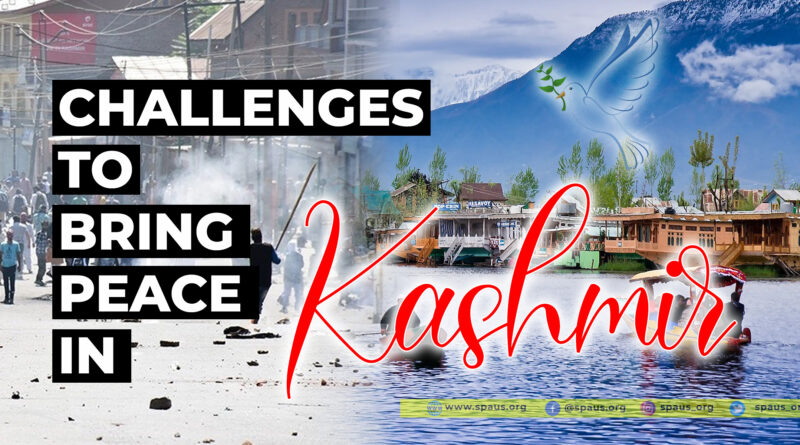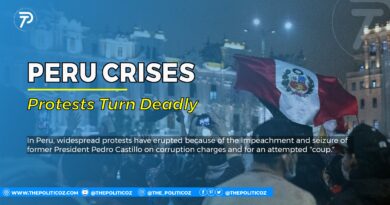Challenges to bring peace in Kashmir
The Muslim majority valley of Kashmir has been under cage since Hindutva-driven Indian Prime Minister Modi unilaterally scraped Article370 (3) and Article 35(A) of the Indian Constitution and revoked the special status of Kashmir which was inculcated in the Indian Constitution by the founding fathers of India and lost peace in Kashmir. Since then the relations between both parties to the Kashmir dispute, Pakistan and India have become severe. Both of the countries have cut the bilateral trade and diplomatic relations. The Indian Prime Minister Narendra Modi sees Kashmir from not the only territorial lens but through the prism of water superiority either. He has threatened multiple times to cut off the flow of water to the Pakistani rivers. Prime Minister Modi has adopted various administrative and political strategies to revoke the special status of Kashmir. Moreover, owing to gross violations of Human Rights in the Kashmir valley, various international entities including Amnesty International, Al Jazeerah, and European Parliament have criticized the humanitarian crises in Kashmir by 900K Indian troops. Although Genocide Watch has described Kashmir as a “Genocide Risk Area”, however, the response from major powers has remained disappointing.
Indian oppressive designs to sabotage the peace in Kashmir
The first and foremost challenge to bring peace in the occupied valley is the oppressive designs of India. The largest democracy of the world, India, is led by the leadership of Narendra Modi, who is a life member of Rashtriya Swayamsevak Sangh (RSS), an ideology inspired by Nazism that assassinated the Great Mahatma Gandhi. The RSS believes in ‘Akhand Bharat’ and treats other minorities as a threat to Indian soil. In 2002, the Indian state of Gujrat faced riots in which 2000 Muslims were killed and all this happened under the watch of then Chief Minister of Gujrat and incumbent Prime Minister of India Narendra Modi. India has, multiple times, blamed Pakistan for its internal disturbances; however, it simultaneously spreads instability in Pakistan from the Afghan border. The Indian spy Kalbhusan Yadav was also captured by the Pakistan forces from Balochistan which is a live example of India’s motives to destabilize Pakistan.
Disregard of the issue by Major Powers
The Kashmir valley remains the only nuclear flashpoint in South Asia that can trigger a nuclear war between two arch-rivals, yet major powers have disregarded the issue. The Major Powers like the United States, Britain, France, and Russia have remained silent over the brutalities of Indian forces in the occupied valley. They are not ready to lose the market of 1.3 billion inhabitants and they see India as the only country in the region to contain the rising power of China. India continuous to violate United Resolution 91 and 122 that forbade India to take unilateral action in Kashmir and 30 Articles of Universal Declaration on Human Rights 1948. Ignoring all these facts, the United States signed BECA with the Indian government to make it closer to the United States to pursue its interests in the region i.e. counter the growing influence of China.
Hydro politics by India
India’s desire to gain water superiority through Hydro Politics is another challenge to bringing peace to the Kashmir valley. The Quaid E Azam Muhammad Ali Jinnah said, “Kashmir is the jugular vein of Pakistan” because all of its water resources flow from Hindukush Mountains by navigating the Kashmir valley. The Indian leadership sees Kashmir not only through a territorial lens but through the prism of water superiority as well. Prime Minister Modi has threatened multiple times to cut the flow of water that flows to Pakistan’s rivers. Moreover, India has also built 330 MW Kishanganga Hydropower Station Dam on Neelum River by violating the Indus Water Treaty of 1967 that was mediated by the World Bank. Similarly, India is also building Kalnai and Pakal Du Power Stations in the Chenab basin to deprive Pakistan of its waters. India’s desire to get water superiority in the region has plunged the occupied valley into deep darkness.
Economic Woes of Pakistan
Pakistan’s economic woes are one of the hurdles to bringing peace to Kashmir. Being a dependent country, Pakistan’s voice is never heard by the world powers. In early 2019, Pakistan, owing to its deteriorating economy, was headed towards bankruptcy. At that difficult time, when Pakistan’s economy was in the doldrums, Pakistan’s long-lasting allies e.g. China, the United Arab Emirates, and the Kingdom of Saudi Arabia came forward to rescue Pakistan’s failing economy. How can a nation with a poor economy be heard in the international arena? Although, the incumbent Prime Minister of Pakistan Imran Khan termed himself as the “Ambassador of Kashmir” and promised to raise the plight of the Kashmiri people at every possible international forum. The 73rd United Nations General Assembly session witnessed Mr. Khan’s 55 Minutes long speech, in which he devoted the majority of his time to remind the United Nations of its promise to the Kashmiris that they’ll be provided the opportunity to decide their future through a plebiscite mentioned in the United Nations Resolution 47 of 1948. However, all the efforts went in vain because the United Nations as always didn’t pay heed to the concerns raised by the Pakistani Prime Minister.
Pakistan’s Image dilemma
Pakistan’s image dilemma is another obstacle in the way to bringing peace to Kashmir. Though Pakistan has been the major victim of terrorism, yet it is termed as a “Safe Haven for Terrorist Outfits”. Pakistan suffered 750000 causalities and over $123 billion lost to the economy in the US-led War against Terror, still, Pakistan is made the scapegoat for the failure of US forces in Afghanistan by Washington. On the other hand, India has one of the worst Human Rights violations records, with more than 32000 rapes cases recorded in India in 2019, and it is the 4th most dangerous country for female travelers. Moreover, the McKinsey Global Institute report has termed India as the 5th worst country in the field of gender equality. However, all these facts are neglected by the western powers owing to a large amount of Indian market.
Therefore, peace in the occupied valley cannot be achieved easily. Although owing to the great diplomatic maneuvering of Pakistan, the United Nations Security Council has discussed the Kashmir dispute thrice in its meetings since the Indian government scraped articles 370 (3) and 35 (A). However, as a champion of human rights and gender equality, the international community must pay heed to gross human rights violations in Indian held Jammu and Kashmir. Moreover, Pakistan also needs to address its economic woes to counter Indian influence internationally. Additionally, Pakistan must continue its diplomatic efforts to raise the voices of the Kashmiri people, who have been targeted by the Indian troops, in every possible international forum. In the end, it is pertinent to mention that peace in South Asia cannot be achieved unless and until the Kashmir issue is resolved as per the resolutions of the United Nations Security Council.
Author
Daniyal Khan, Student of International Relations




